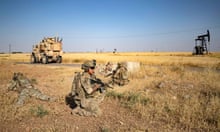A new Russian film tackles one of the country’s great taboos: the role of Russian mercenaries in trouble spots around the world and the toll this takes on the family members of the often unacknowledged soldiers who die in combat.
“Mama, I’m Home”, produced by Alexander Rodnyansky, who is well known for the critically acclaimed, Oscar-nominated Leviathan and Loveless, depicts the story of a mother searching for her son after being told he was killed while fighting for a private military company in Syria.
The movie, based in Nalchik, a city in the south of Russia, follows Tonya, a local bus driver who starts a gruelling battle with the authorities, demanding answers about her son’s role in a war officials say they know nothing about.
“A story about a mother’s anger, grief and desperation over her child’s death is universal and recognisable for audiences across the world,” said Vladimir Bitokov, the movie’s director. “We wanted to show that struggle in the context of the largely taboo topic of Russian mercenaries.”
Hundreds of Russian mercenaries are believed to have died while fighting in Syria since the start of the civil war in 2011.
Bitokov said the script for the film was inspired by a number of reports of family members of mercenaries looking for their loved ones. “We read all we could on this and used real-life stories as details,” he added.
A number of outlets, including the Guardian, have written about how Russian soldiers have reportedly fought in Syria as part of the Wagner Group private military company, a shadowy group linked to the Kremlin.

Wagner has allegedly also sent mercenaries to Ukraine, Libya and other African countries where Russia holds a strategic interest.
The US says the Wagner Group is run by Yevgeny Prigozhin, known as “Putin’s Chef” for his catering businesses that hosted dinners for the Kremlin.
Prigozhin denies all links to Wagner and the Russian state disputes claims that it uses mercenaries to promote its interests abroad. Private military companies are officially banned in Russia while the semi-legal framework mercenaries operate under means that family members of the deceased often hear conflicting information about their loved ones and it sometimes takes weeks for their bodies to be returned home.
The film first premiered at the Venice film festival in September and has acquired an international distributor, though it has not yet been scheduled for release in Russia.
Rodnyansky said the aim of the movie was not to make “an in-depth study of mercenaries” but rather to show how the industry can lead to strong personal drama.
“The story wouldn’t have worked if we showed the death of a regular Russian army soldier in Syria because the authorities would have been obliged to help the mother – he would be their responsibility,” said Rodnyansky.
“Everyone knows mercenary groups exist, they are an open secret. Yet they aren’t recognised, which leaves our hero fighting on her own.”
Despite reports of hundreds of mercenaries abroad, much of the inner workings, as well as the geographical scope, of Russian private military companies remains shrouded in secrecy.
Former and current mercenary soldiers rarely give interviews and family members of the deceased, like Tonya in the movie, are generally given about £60,000 and are told not to contact the media. Russian journalists who report on private military companies are frequently threatened, harassed or sued. In 2018, three Russian journalists were ambushed and killed in the Central African Republic as they were investigating Wagner’s activities in the country.
Rodnyansky said he never doubted throwing his weight behind the new picture. “Most movies that I have worked on provoke discussions and tend to polarise. That is what good movies should do.”










